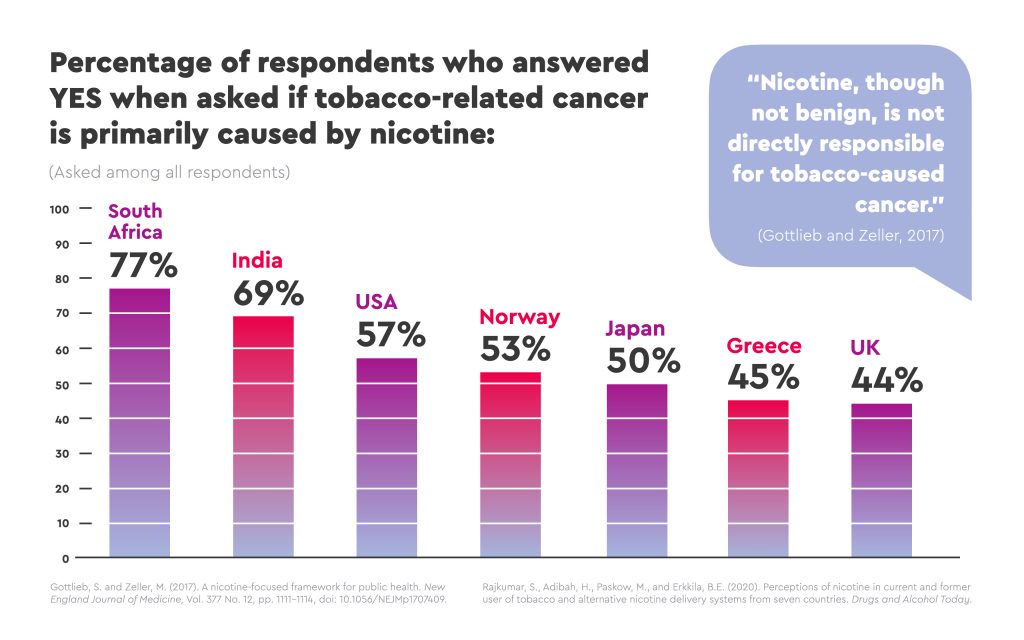New York, July 20, 2020 – New research published in Drugs and Alcohol Today found the public struggles to distinguish between the health impacts of nicotine and those of tobacco, complicating efforts to help smokers switch to science-based smoking cessation and harm reduction strategies. “Perceptions of Nicotine in Current and Former Users of Tobacco and Tobacco Harm Reduction Products from Seven Countries,” analyzes the perceptions of more than 55,000 nicotine consumers across seven geographically dispersed countries against media coverage of nicotine research and products.
The “Perceptions of Nicotine” publication concludes that significant public awareness gaps exist between science and public perception concerning the role that nicotine can play in affecting users’ behavior and health as a core component of harm reduction products (patches, gums, e-cigarettes, etc.). This is despite the agreement among most medical researchers that nicotine is not a carcinogen, and that the harm from cigarettes comes predominantly from other ingredients found in tobacco, including tar.
“The fact that the majority of smokers don’t know the difference between nicotine and cigarettes is troubling for anyone committed to ending the tobacco epidemic,” said Dr. Sarah Rajkumar, Director of Epidemiology for Health, Science, and Technology at the Foundation for a Smoke-Free World, an author of the report. “We would like to work with the media and communications experts to help them provide clearer communications about the current state of knowledge surrounding the health impacts of nicotine versus tobacco. The goal is to educate policymakers on the importance of addressing harm reduction products differently than combustible tobacco.”

Confusion Over Health Risks
A 2017 survey found in many countries a vast majority of smokers use the terms “nicotine” and “cigarettes” interchangeably, suggesting a lack of awareness that nicotine consumption via tobacco harm reduction (THR) products does not carry the same health risks as cigarettes.
The study also examines the Global State of Smoking Poll 2019 of over 50,000 current and former tobacco users in the U.S., U.K., India, Greece, Norway, Japan and South Africa. The survey revealed 65.7% of adult participants believe nicotine causes cancer. This misperception persists even among people who had successfully quit smoking. A majority of quitters in all countries thought nicotine is harmful, while the proportion of quitters who believed nicotine is the primary cause of cancer was slightly higher than among current users.
Popular Media Coverage Seen as Contributing to Misperception
To better understand the source of the misperception, the “Perceptions of Nicotine” report also examined media dialogue and public reporting on nicotine in top-tier, English language outlets across the U.S., U.K., India, and South Africa between January 2019 and March 2020.
The results indicated a consistent pattern of negative media coverage mentioning nicotine, with nearly one third of stories referencing nicotine’s addictive nature and the dangers of dependency. While much of the commentary included limited discussion about the efficacy of e-cigarettes as a smoking cessation tool, there was no media coverage on the potential therapeutic uses of nicotine. Commentary failed to mention, for example, use of nicotine for possible protection against Parkinson’s or Alzheimer’s disease–applications that are being actively explored.
Call for Accuracy and Transparency in Public Dialogue
Dr. Rajkumar’s article concludes with a call-to-action to enhance accurate characterizations of the science behind nicotine research and tobacco harm reduction (THR) products to ensure the global smoker population has access to the resources they need to quit.
“The data is clear that public perceptions of nicotine often conflict with available scientific evidence,” said Dr. Derek Yach, president of the Foundation for a Smoke-Free World. “High levels of confusion – driven by deliberate mischaracterizations of nicotine – hamper the adoption of science-based cessation and harm reduction strategies to reduce death and disease from smoking.”
The “Perceptions of Nicotine” article was published as part of a broader special edition of Drugs and Alcohol Today, featuring forthcoming research developed by FSFW staff and global health experts. The additional articles cover an array of issues related to tobacco control, science-based cessation, and harm reduction strategies.
The Foundation for a Smoke-Free World is an independent, US nonprofit 501(c)(3) organization with the purpose of improving global health by ending smoking in this generation. The Foundation supports its mission through three core pillars: Health, Science and Technology; the Agricultural Transformation Initiative; and Industry Transformation. The Foundation has received contributions from Philip Morris International (PMI) in 2018 and 2019 each in the amount of US$80 million. PMI has pledged to contribute $80 million annually for the next ten years. Under the Foundation’s bylaws and pledge agreement, PMI and the tobacco industry, generally, are precluded from having any control or influence over how the Foundation spends its funds or focuses its activities. The Foundation’s acceptance of the contributions does not constitute an endorsement by the Foundation of any of the pledger’s products. For more information about the Foundation, please visit www.smokefreeworld.org.
© 2023 Foundation for a Smoke-Free World. All rights reserved.